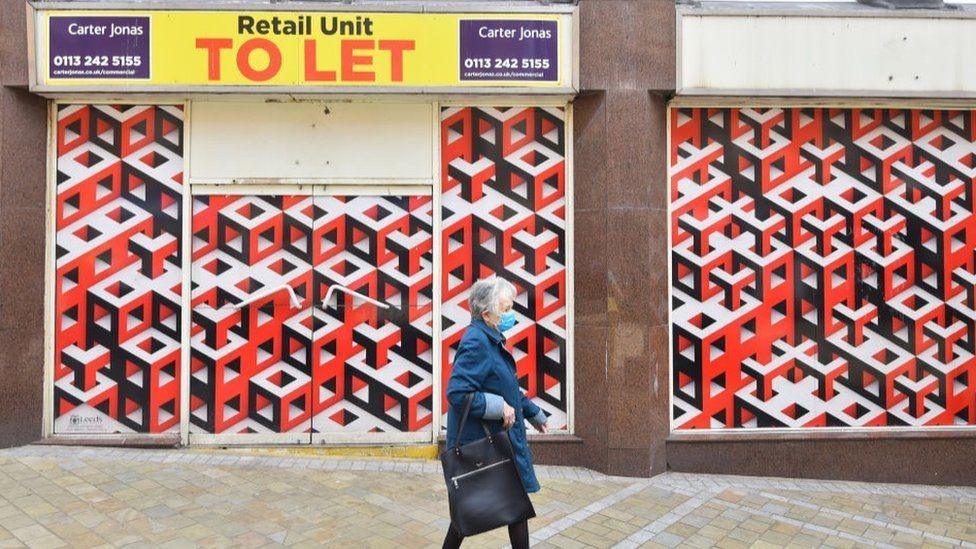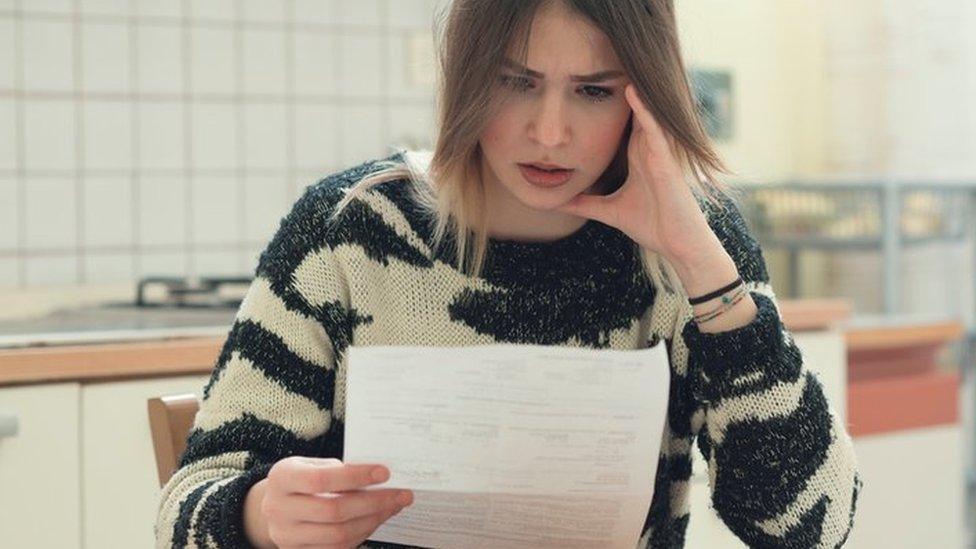Budget 2021: Business rates cut for shops, restaurants and gyms
- Published

Shops, restaurants and bars and gyms in England which have been badly hit by the Covid-19 pandemic have been given a financial boost in the Budget.
Chancellor Rishi Sunak announced a temporary 50% cut in their business rates, up to a maximum of £110,000.
In addition, he has scrapped 2022's planned annual increase in rates for all firms for the second year in a row.
The hospitality industry welcomed the move, although it added "the devil will be in the detail".
Business rates are charged on commercial premises based on the value of the property and the level is set by central government, rather than councils. They are devolved across the UK's nations.
The Treasury only decides business rates in England, but the UK government also allocates funding to Scotland, Wales and Northern Ireland through a formula.
This could allow the devolved nations to mirror the changes in England or, alternatively, keep their current business rates and spend the money elsewhere.
Bricks and mortar firms have long complained that they are at an unfair disadvantage compared with online retailers, which do not have to pay business rates. They want to see an online sales tax being applied.
In his Budget speech, Mr Sunak said that in the 2022-23 tax year, pubs, music venues, cinemas, restaurants, hotels, theatres and gyms would be able to claim a discount on their bills of 50%, up to a maximum of £110,000. He said that was a tax cut worth almost £1.7bn.
In conjunction with the existing Small Business Rates Relief, the chancellor said the move meant more than 90% of all retail, hospitality and leisure businesses would see a discount of at least 50%.
Business rates in the retail and leisure sectors have already been reduced during the present financial year following the rates holiday during the pandemic.
The Treasury has been carrying out a wider review of business rates.
In his Budget speech, Mr Sunak confirmed they would be retained and reformed. "We on this side of the House are clear that reckless, unfunded promises to abolish a tax which raises £25bn every year are completely irresponsible."
However, he said the system would be made "fairer and timelier with more frequent revaluations every three years". beginning in 2023.
In addition, from 2023, all firms, not just in retail and hospitality, would be able to make improvements to their property without having to pay extra business rates for 12 months.
The reforms also include a new relief for firms that invest in green technologies, such as solar panels and heat pumps.
'Incredibly fragile'
UK Hospitality chief executive Kate Nicholls: "We have been lobbying hard for significant reform of the outdated business rates system and therefore very much welcome the chancellor's move today to extend the 50% business rates relief for the hospitality and leisure sector for the next financial year.
"The devil will be in the detail, though, so we look forward to learning to what extent it will benefit businesses."
Allow X content?
This article contains content provided by X. We ask for your permission before anything is loaded, as they may be using cookies and other technologies. You may want to read X’s cookie policy, external and privacy policy, external before accepting. To view this content choose ‘accept and continue’.
Ms Nicholls also said announcements simplifying, and in some cases cutting, alcohol duties were "great news" for pubs, bars and restaurants and "will benefit all".
However, she added: "Positive as these announcements are, hospitality remains incredibly fragile, facing myriad critical issues. Rising utility bills, wage bills and food and drink prices have resulted in 13% inflationary costs that businesses are having to absorb at the same time as they navigate severe supply chain issues and chronic staff shortages.
"Given this toxic cocktail, it is imperative the government go further to support businesses in our sector."
She said the best way to do that would be to keep the current lower rate of 12.5% VAT on hospitality.
"The chancellor has been bold and radical with alcohol duty - we urge him to adopt the same approach when implementing root and branch reform of business rates, to ensure industries share the burden equally."
Elsewhere, the director general of the British Chambers of Commerce (BCC), Shevaun Haviland, said the chancellor had listened to the BCC's "long-standing calls for changes to the business rates system and this will be good news for many firms".
"It will provide much-needed relief for businesses across the country, giving many firms renewed confidence to invest and grow."

CBI director general Tony Danker said the chancellor had made "real strides in making the system more palatable for businesses in the shorter term. More frequent valuations, wider reliefs and improving the incentives for firms to decarbonise their premises is what firms have been calling for".
However, he added that the "hard truth" was that "the government missed the opportunity to truly reform a business rates system that diminishes Britain's high streets and factories".
Julian Bird, chief executive of Society of London Theatre and UK Theatre, welcomed the move, saying it would "provide venue operators with the cushion of a lower cost base as they reopen and develop an audience post-pandemic.
"The 100% improvement relief for business rates, providing 12 months relief from higher bills for occupiers where eligible improvements to an existing property increase the rateable value, from 2023 will encourage innovation and enhancement of our theatre buildings," he added.
- Published27 October 2021

- Published27 October 2021

- Published27 October 2021
